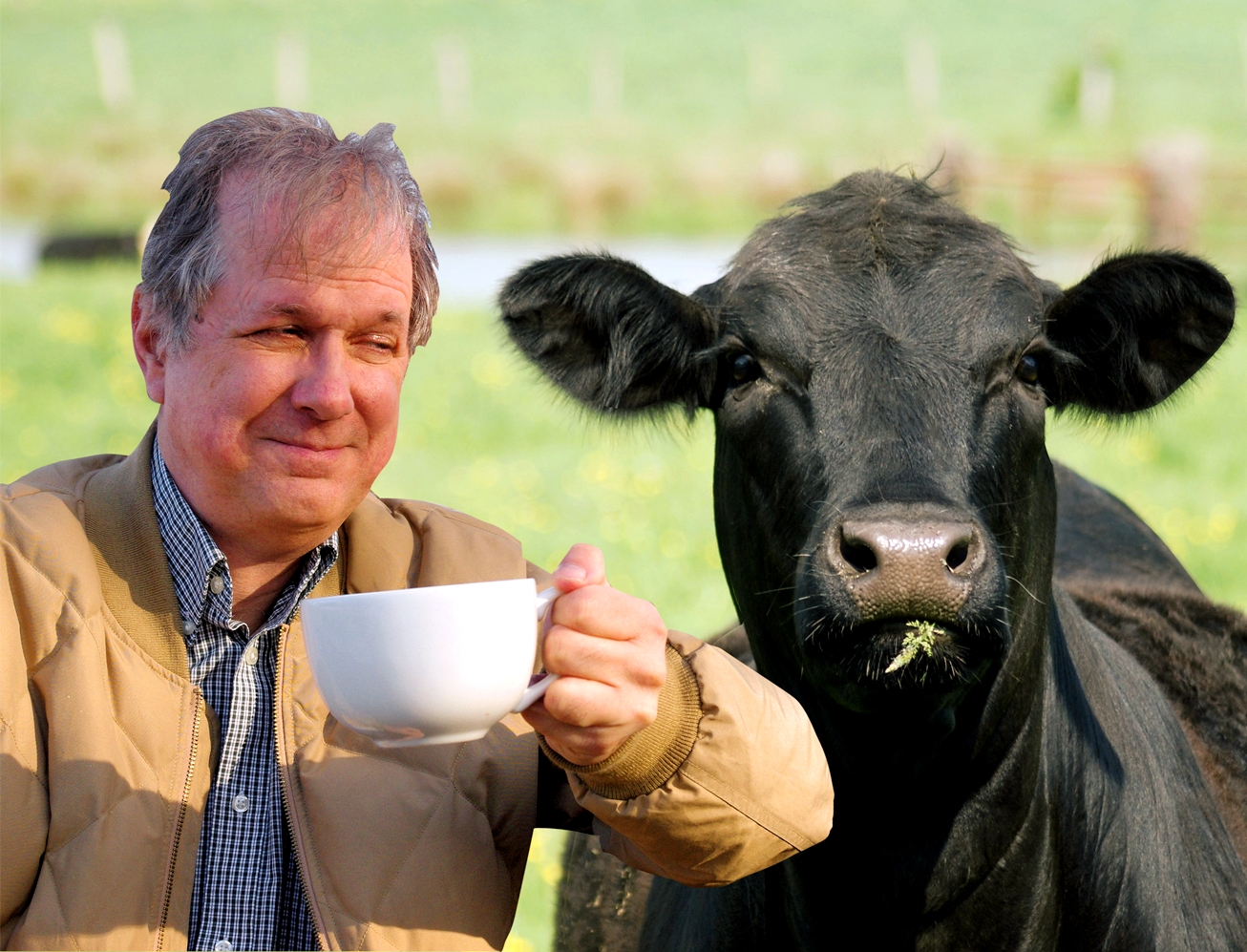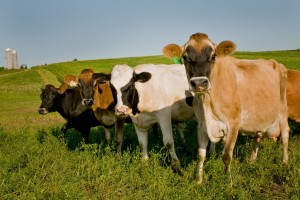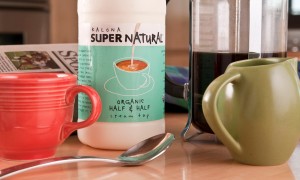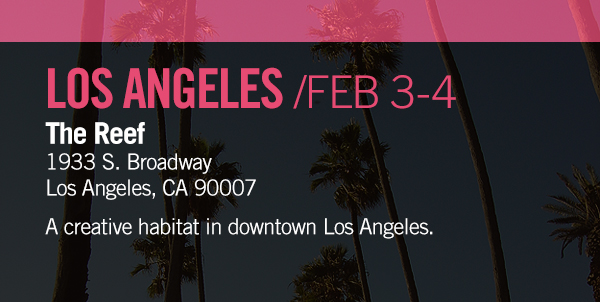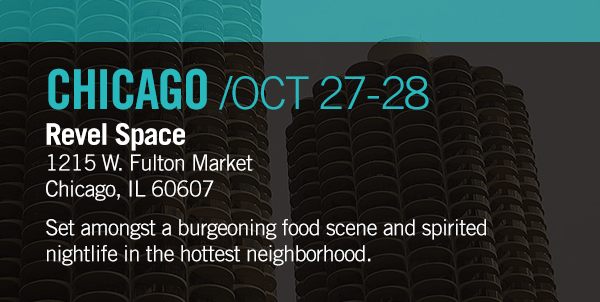Since CoffeeCon’s beginning, I’ve wanted everything associated with coffee brewing to be the top tier. Of course, this means milk, too. Although much of CoffeeCon’s exhibit and tasting floor is pure coffee sampled by itself, it would be naïve and bad manners not to offer top milk and cream products for those who consider coffee without cream an unfinished product. Meanwhile, we offer café latte samples, milk texturing and art classes, and our latte art throwdown absolutely requires a high performance dairy product. All this lead to my decision to reach out to Kalona SuperNatural™.
I became introduced to Kalona SuperNatural products through The Standard Market grocers. I was drawn to Kalona for their steadfast insistence on providing non-homogenized milk. I really knew nothing else about them. Anyone familiar with the subject already knows that homogenization was invented in the industrial revolution to give milk a smooth consistency to allow mixing various large batches to standardize taste. As the local foods and return to less-processed foods movement has grown, there’s been growing consumer interest in non-homogenized and minimally processed milk; though there’s no evidence that homogenization offers any health benefit. I started to purchase Kalona SuperNatural products. I found they had a unique, arguably purer taste, but I had no idea why. All I knew is they seemed to taste better, and to the purist in me, I was happy. I decided to reach out to them to see if they’d consider being the milk sponsor for our upcoming CoffeeCon Chicago event. After they said yes, I asked to do the following interview with Sara Rissi and Mindy Seiffert from Kalona SuperNatural’s Marketing Department.
Kevin: Whenever I see homogenization, it is often right next to pasteurization. How are they different?
Sara: Pasteurization is a process that reduces bacteria using heat. All of our products are pasteurized, but at low temperatures. Homogenization is a mechanical process that breaks down the fat globules and evenly disperses them throughout the milk. Both low-temp pasteurization and non-homogenization allow our products to retain the rich, creamy farm-fresh flavor.
Kevin: Is the lack of homogenization the key reason your products taste so different?
Sara: Actually, there are a number of factors that give us a unique taste profile. The biggest thing is that Kalona SuperNatural products are processed as little as possible; we try to keep all of our food in the most natural state. You’ve already identified non-homogenization. Homogenization certainly destroys the sweet creamy flavor of the milk. Cream separating from the milk is a natural occurrence.
Mindy: I’d like to add that there are a variety of things that affect taste, not just homogenization. We use a lower temperature pasteurization. Our milk is pasteurized at around 160°F, which kills the potentially unhealthy bacteria, but leaves the healthier bacteria intact. Our milk comes from grass fed cows, living on small family farms. The quality is different than from a commercial dairy.
Kevin: Isn’t all milk pasteurized at the same temperature?
Mindy: No it isn’t. I mentioned 160°F as the temperature we use. Most large dairies use a higher temperature, which we’ve believe compromises that fresh dairy taste. Interestingly, a lot of organic milk suppliers use an even higher temperature process, UHT or Ultra High Temperature. It’s great for supermarket shelf life, but it’s even more detrimental to taste.
Kevin: I’ve read that the fats in grass-fed cow’s milk is arguably healthier. True?
Mindy: Grassfed milk is higher in CLAs and Omega fats, and our products in generally higher in fat. There’s a big push in certain circles that fat is healthy. There are people who believe that the Omegas and CLAs are healthier fats and that the vitamins are better in grass-fed than in so-called regular milk.
Kevin: Regular milk meaning….?
Mindy: Most milk is from cows given a diet of grain. It’s safe to say the milk industry at large is not grass-fed.
Kevin: You say Kalona’s milk has a higher fat than most other brands. Numbers?
Mindy: Our whole milk runs higher than the minimum requirement. It is no less than 3.25%.
Kevin: How about the fat content in your Whipping Cream?
Sara: The butterfat levels in our Whipping Cream generally range from 30-36%.
Kevin: Yes, that’s definitely higher than average.
Mindy: Our consumers love full-fat dairy. We sell more whole milk than any other brand out there. There are people out there who stayed away from milk due to health related issues. They’ve tried ours and tell us they are able to drink milk again.
Kevin: That’s never been a problem for me. I just want the best tasting of everything. I want to know why things taste better, that’s all.
Sara: Well, our company does do things differently than most other dairy brands out there. The combination of milk from grass-fed cows, not homogenizing our products, and using low-temp pasteurization all allow us to make delicious, fresh products!
Kevin: Give me a little history.
Sara: Farmers All-Natural Creamery was started in Kalona, Iowa in 2005. The product line was created to take the local Amish farmers’ premium milk to market. Originally, they produced a line of fluid milk products and butter. A couple years later, they started another brand offering a line of yogurts. In 2010 we decided that all of these products needed to be one family, so Kalona SuperNatural was born. We wanted the brand name to represent not only the area where the products are created, but also what our products stand for. Kalona is a tight-knit Amish and Mennonite community in South Eastern Iowa. The closest large town near Kalona is Iowa City.
Kevin: Are the farms you get your milk from unusual?
Sara: Yes, the milk we use to make Kalona SuperNatural products comes from small family Amish and Mennonite farms. By small, I mean an average of 35 cows per farm, instead of more than 100 you’d seem typically in the dairy industry. On average, the farms are about 90 acres, giving the small herds plenty of grazing room, far above average.
Mindy: Most of these farms have been in the same family for 150 years. They’re not new to organics. They’ve always been organic. No chemicals, pesticides or herbicides have ever touched them.
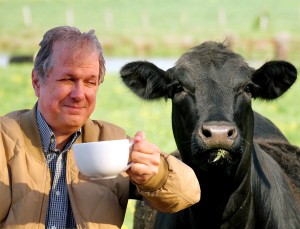
Mindy: Many branded manufacturers do not know where their milk comes from. DFA is a milk procurement company that works in the conventional world. They pick up milk from several farms and deliver it to one of the larger creameries. A larger commercial dairy would not have the same relationship with their farmers.
It’s definitely possible they work with whoever picking up their milk so ensure that they’re meeting the set of criteria, so it could be legitimate. It seems that the larger the creamery or the brand, the less they seem to know about the actual farm level.
Kevin: I suddenly realized I have no idea if either of you drinks coffee.
Mindy: Of course, Coffee Kevin! (laughs) But, just to be completely transparent, I’m a black coffee drinker.
Sara: I use milk or cream, whatever I have in the fridge! I like the combination of coffee and dairy.
Kevin: Anything else you’d like us to know about Kalona?
Mindy: We are a small family of companies. We have 62-65 employees. Open Gates, our parent company provides payroll, accounting, marketing services. Farmers Creamery is the processor and Kalona Organics provides the sales and marketing support for the Kalona SuperNatural brand.
Kevin: Seems like you’ve got it all figured out.
Mindy: We even own a trucking company to have a better way to get our products to market. Also, we recently purchased a building, where we will eventually receive milk: Kalona Creamery. Phil works for Kalona Farms. Bill Evans is our CEO and owner.
